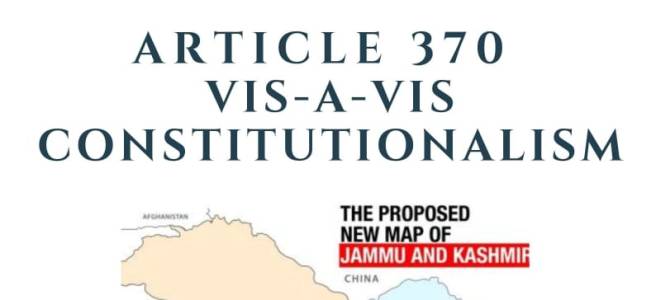By Preyoshi Bhattacharjee & Mayank Sharma
The CRCLP took off with its first Friday discussion on 16 th Aug, 2019 on the
burning issue of Article 370. The discussion focused on analysing the recent
abrogation of Article 370 in the light of constitutionalism. A total of 4 speakers from 4th and 5th year discussed various aspects of the issue.
Ananya Sharma from 5th year opened the discussion by explaining the
difference between constitution and constitutionalism. She also discussed how it is important to uphold the spirit of constitutionalism for rule of law to prevail.
Manpreet form 5th year discussed the historical background of the Kashmir issue and how it was faced with the dilemma of joining either Pakistan or India or to remain a sovereign state. When Pakistan violated the Standstill Agreement and launched Operation Gulmarg in order to take over Kashmir, Maharaja Hari Singh signed Instrument of Accession in return for India’s assistance to protect the Kashmiri soil. Which later on led to the introduction of Article 370 in the Indian Constitution. The matter was further taken to the UN and in later years simmered into the burning “Kashmir issue”.
Deepika Sangwan from 5th year pondered upon the question, whether the abrogation of Article 370 was a Constitutional Amendment as provided by Article 368. She discussed the procedural aspect of Article 368 and the substantive limitation on the amendment powers of the Parliament in the light of landmark cases starting from Golaknath (1967) to Kesavananda Bharti (1973) and Minerva Mills (1980) along with the 24th and 42nd Constitutional Amendments.
Gunsimran from 4th year finally discussed the legal technicalities of the recent Presidential Order made under Article 370 and the amendment made thereto to the Article 367 where Constituent Assembly of J&K has been construed to be the Legislative Assembly of J&K which further has been interpreted to be Governor of the State, who in turn has been equated with the Parliament. Thus leading to a situation where Parliament took its own permission to abrogate Article 370, thus bypassing the original requirement of consulting the Constituent Assembly of Jammu & Kashmir. Article 370 still remains to be the part of the text of Constitution and only its operation has been diluted. The State of Jammu and Kashmir has now been bifurcated into two Union Territories of J&K and Ladakh as per the State Reorganisation Bill, 2019.
Overall the discussion proved to be informative session for the students.
Concluding the discussion, questions were taken from the students by the
speakers.

